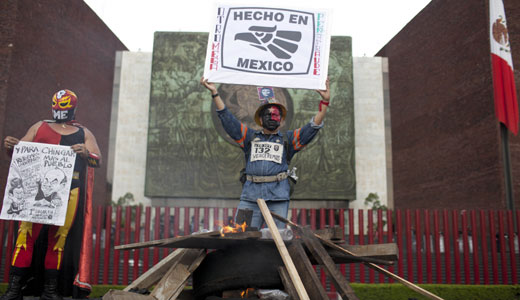
Mexico’s right-dominated Chamber of Deputies, the lower house of its Congress, has passed new anti-labor legislation. The bill, introduced at the behest of outgoing President Felipe Calderon of the National Action Party (PAN), was also supported by deputies from the Revolutionary Institutional Party (PRI) of President-elect Enrique Peña Nieto and by the Green Party. It was opposed by the parliamentary left. Nieto takes office December 1.
Mexico has had, on paper, progressive labor laws. However, workers have trouble defending their interests even where there is a union. Although about a quarter of Mexican workers are unionized, the majority of unions are what is called in Mexico “charro” unions after Jesus Diaz de Leon, a corrupt railway union leader of the post World War II period, distinguished by his propensity for dressing up as a Mexican fancy dress cowboy or “charro” as well as for selling out the interests of his members.
The “charro” or “corporativist” unions are institutionally linked to the PRI. The result is that workers who try to challenge conditions on the job often find themselves faced with a united front of employers, government and their “own” unions. “Protection” (sweetheart) contracts are rife. Members are required to support the PRI in elections.
Dissident union leaders have met with drastic consequences: In 1989 President Carlos Salinas de Gortari (PRI) sent in armed contingents to arrest petroleum workers’ union leader Joaquin Hernandez Galicia and several colleagues, who were given stiff jail terms for illegal possession of firearms. Many, however, suspected that the real issue was that a strong leadership in the union would eventually be an obstacle to stealth privatization of the Mexican national petroleum industry.
A highly visible minority of mostly left-led unions are independent of the corporativist setup. They include the Mexican Electricians Union (SME) and the Mine and Metal Workers Union, telephone workers, university personnel and some teachers. They are grouped in two dissident federations: The National Workers’ Union (UNT) and the Authentic Workers’ Front (FAT). Under both PRI and PAN governments these unions have been constantly embattled.
Calderon and his friends in the Mexican ruling class and international monopoly capital are hoping that the labor law reform passed on Friday can be the first nail in the coffin for the independent unions.
The principal changes:
– Many workers now paid on a daily basis will be moved to hourly. This will represent a significant loss of income for many.
– Employers will be authorized to hire people on provisional, training, and temporary bases. The hours will not count for seniority. Promotion to permanent status will be based on “productivity” instead of seniority.
– Outsourcing will be made easier.
– Back wages payable to workers in labor disputes or who were unjustly fired will be limited to one year, making it cheaper to union-bust and fire workers.
– New unions that are challenging an existing bargaining agent will have to make public the names of at least a third of their supporters, exposing them to dismissal, blacklisting or violence.
In the original draft, unions also would have had to open their books to external audits, and run clean internal elections. To assuage the “charro” unions and the PRI, these clauses were removed. Such openness might reveal various kinds of malfeasance and show that some of the “charro” unions have far fewer members than claimed.
Nothing would change in terms of work week minimum wage or all but nonexistent support for laid off workers and the unemployed. The “toma de nota” procedure, by which the government can arbitrarily refuse to recognize the results of union elections, stays.
Calderon justified his anti-union bill in terms of attracting more foreign investment, and creating jobs for young people and returning immigrants. The election of the PRI’s Enrique Peña Nieto and of a Congress in which no one party has a majority, but in which the left, although strengthened, cannot block joint PAN-PRI initiatives, set the stage for the passage of this labor law “reform.”
In the Sept. 28 vote the bill garnered 351 votes from the combined forces of the PAN, PRI and Greens (a right-wing party in Mexico). In opposition were the 130 votes of the three left-of-center parties in the chamber: the Revolutionary Democratic Party (PRD), Labor Party (PT) and Citizens’ Movement. The 10 deputies of the National Alliance Party, headed by teachers’ union leader Elba Esther Gordillo, abstained. The bill now goes to the Senate, where the de-facto PAN-PRI-Greens alliance will almost surely be able to repeat the feat.
While the bill was being rammed through, independent unions, citizens’ organizations, the important #I Am 132 (#Yo Soy 132) youth movement, and the parties of the left in and out of Congress carried out mass demonstrations against the measure.
Messages of solidarity came from U.S. and other international labor organizations, including the AFL-CIO, the U.S. Steelworkers, and the United Electrical, Radio and Machine Workers unions who have been increasingly active in giving solidarity and support to Mexico’s independent unions.
Photo: Mexican workers demand labor reforms outside Congress in Mexico City, including increasing union fairness and democracy. Alexandre Meneghini/AP

MOST POPULAR TODAY

Zionist organizations leading campaign to stop ceasefire resolutions in D.C. area


High Court essentially bans demonstrations, freedom of assembly in Deep South

Communist Karol Cariola elected president of Chile’s legislature

Afghanistan’s socialist years: The promising future killed off by U.S. imperialism






Comments